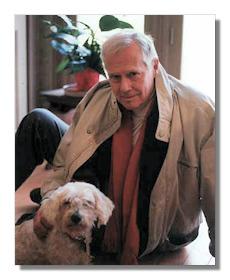
The Internet's Premier Classical Music Source
Related Links
-
Find CDs & Downloads
Amazon - UK - Germany - Canada - France - Japan
ArkivMusic - CD Universe
Find DVDs & Blu-ray
Amazon - UK - Germany - Canada - France - Japan
ArkivMusic-Video Universe
Find Scores & Sheet Music
Sheet Music Plus -
Recommended Links
Site News
Ned Rorem

(b. 1923)
Born in Indiana to a Quaker family, Ned Rorem (October 23, 1923) grew up in Chicago, where he studied with Leo Sowerby, among others. Although he entered Northwestern at a normal age, his early career gives off an air of precociousness in his eager pursuit for independence. He soon transferred to the Curtis Institute, where he studied with Rosario Scalero, teacher of Samuel Barber and Gian-Carlo Menotti. However, he considered Scalero too inflexibly conservative and left, all 20 years of age, to become secretary and copyist to Virgil Thomson, in exchange for composition advice, especially regarding orchestration and prosody. The latter came in handy when Rorem began to write songs. He also studied at Tanglewood under Aaron Copland and at Juilliard, where he graduated with an MM degree in 1949.
However, Rorem had begun to attract serious attention in the late Forties for his songs. He had excellent literary taste and gifts for melody and for turning poetic structures into musical ones. In 1949, Rorem left for Paris, where he studied with Arthur Honegger. He lived in Paris – with time out for travels in North Africa (where he befriended Paul Bowles) – from 1952 to 1958. In Paris, he became part of the influential musical circle associated with Cocteau. He became friends with Jean Cocteau, Georges Auric, and Francis Poulenc, among others. Increased interest in his music in the United States prompted his return, where he taught off and on at Curtis and at various universities.
Nevertheless, Rorem became far better known for his diaries and polemical writing (sometimes the same thing) than for his music. Reviewed in The New York Times, the diaries may well have been the first time a homosexual artist reported on his intimate activities in great detail to a mainstream audience. Rorem has written that he simply didn't feel like lying about himself. Way before Stonewall and Gay Pride, the diaries caused a sensation (Rorem didn't hesitate to include Rimbaud-like detail and decadent adventure). Unfortunately, the sensation swamped the music. Rorem gets commissioned and performed, but not critically discussed – that is, taken seriously enough. This is a shame, because the music is quite good. Some of this lack of regard comes from the fact that Rorem is tonal but emotionally fastidious. He has used "advanced" techniques, and his harmonies can become rather stringent. Nevertheless, Rorem has argued that all music is fundamentally tonal. However, traditional development – catnip to most musical critics – doesn't particularly interest him. He finds other methods of coherence, often based in American popular music, although he rarely sounds like "pop."
Although he won the Gershwin Prize for his Overture in C and the Pulitzer for his instrumental Air Music, his songs and choral music have made the biggest impression. I'd single out the opera Miss Julie, the cycles Poems of Love and the Rain, The Santa Fe Songs, and War Scenes and the choral Pilgrim Strangers as especially fine. One distinction of his songwriting is his ability to set texts you wouldn't normally think of as suitable for singing. He is a genius at finding the emotional and structural crux of a text and giving those back in music. The instrumental works strike me as less direct but more interesting: the Overture in C, Air Music, three symphonies, a violin concerto, two piano concerti, the tone poem Lions, and A Quaker Reader either for organ or for orchestra. Again, you don't have traditional Haydnesque "signposts" to look for, but once you fasten on, Rorem takes you on remarkable rides. ~ Steve Schwartz
Recommended Recordings
 rep
rep
- Recommendation to come…
rep
- work works
-
ensemble













